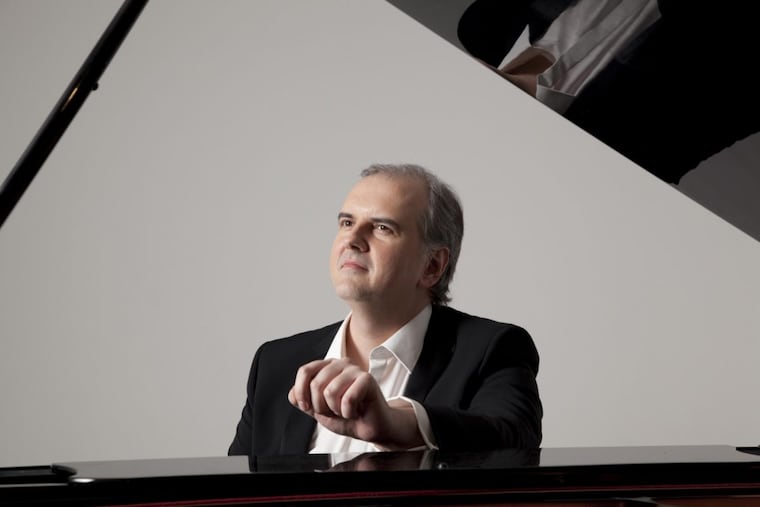Nicholas Angelich joins Stéphane Denève and Philadelphia Orchestra on musical jaunts
Bird sounds, a love song, and exotic techniques find their way into musical scores when composers shake out their travel diaries for ideas. This week's Philadelphia orchestra program had them all.

A delicate scrim of avian babble. A Nubian love song once heard on the Nile. Faint memories of Italy drifting in like a scent on the breeze.
The concept of orchestral music as sensuous travelogue emerged as a strong thread on the first night in this week's Philadelphia Orchestra program with principal guest conductor Stéphane Denève, even if the birds didn't quite materialize on cue.
Three-quarters of the repertoire was of the familiar easy-listening variety, works you encounter on radio fairly often — Berlioz's Roman Carnival Overture, Respighi's The Pines of Rome, and even Saint-Saëns' odd Piano Concerto No. 5.
The one novelty, E chiaro nella valle il fiume appare, by Guillaume Connesson, wasn't a household name, but, being both filmic and concise, the music had a familiar ring to it. Denève has championed the 47-year-old French composer, as he has the music of John Williams, and both composers tell a story in an emotionally direct way.
The title, which means "and the river shimmers in the valley," comes from a poem by Giacomo Leopardi, and it is highly perfumed music. It leads us on a short journey in various compositional modes, and if Italian themes floated by in a river of lush, there was also the enigma of more Eastern-sounding material to ponder.
The 19th-century concept of the exotic seemed to spill right out of Saint-Saëns' notebook into his Piano Concerto No. 5, with Javanese and Spanish music as well as the tune he heard on the Nile (he wrote the concerto in Luxor, which explains the "Egyptian" subtitle the piece has acquired). That all this could be made coherent — while absorbing a pianistic move or two of Brahms and Tchaikovsky — was in no small part thanks to the soloist, Nicholas Angelich.
The work is Romantic, even schmaltzy. But then there are fascinating glimpses of unusual material. In the piano bell tones where corresponding harmonics are manually played more softly above the fundamental pitch, Angelich's balance was perfection. The pianist, while plenty bright and virtuosic, knew when and how to grow more atmospheric.
In the end, all four pieces on the program were more effective about bringing you into their various vapors and triumphs than anything else.
The blaze of brass at the end of the Berlioz moved the air in Verizon Hall, as did similar forces at the end of The Pines of Rome. Denève paced the steamroller of sound at the end beautifully.
But Denève brought a souvenir of a past even more distant than either Muti or Ormandy, in the form of a 78 record and gramophone. They were set up on stage, ready to release bird sounds in the Respighi at a moment that remains unsurpassed in its magic.
When the moment arrived, percussionist Christopher Deviney tried, and nothing happened. He gave the old 78 disc a push by hand, but all that came out were a few warped pitches.
These days, those bird sounds are usually played via something more digital. And it turns out that sometime after rehearsal, unbeknownst to Deviney, someone had moved the lever that engages the gramophone's brake.
Not to leave himself with a sonic debt to the audience, Denève finished the piece, politely quieted the applause, and directed the musicians back to work. He would even cover the overtime, he quipped.
And so the orchestra played the spot again, and this time birds chirped and tweeted. It wasn't the same, of course. Part of the effect is the surprise, and when you're listening for it, the spell is broken. But you had to feel grateful for Denève's good customer service intentions. Late birds are better than no birds at all.
Additional performance Saturday at 8 p.m., Verizon Hall, Broad and Spruce Streets, $10-$158, 215-893-1999, philorch.org.